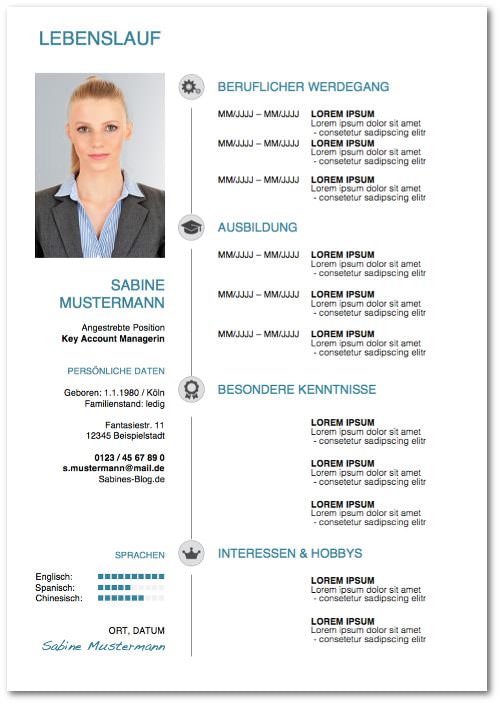CVs in Germany are a "(tabellarischer) Lebenslauf".
The Lebenslauf in Germany are quite different from anglophone countries, they always include a current photo (don't need to say that you must give a good impression), your complete address data, your birth data (location and birthday), your marital status and your hobbies and interests. I only give this as background information, there are tons of information about that, so I only answer the actual question.
The chronology of your lifetime must be chronologically ordered (both from first to last and last to first are known, the last to first is more modern because it gives the important information at once), complete and without gaps, so you need to add military service to your CV.
Here an example:

It depends on your age how it is build, if you are a beginner, you can also include the primary school (to fill space), but if you are older, you only mention the highest achieved school grade and your end of your education (master, PhD, master craftsman). But it does not matter if you had military service, if you were jobless (especially then), if you were nursing your sick mother or if you traveled the world, everything must be mentioned. The timeframe is given in months/year format, so as an example:
06/1997 - 08/2001: Working as an engineer at Lufthansa.
While there may be gaps, they should be explainable and not exceed 3 months. It is also not expected that you mention every small job (waiter, taking out newspapers, postal service), you can subsume that under "temporary work".
Military service itself has no stigma (especially if compulsory), it is seen like school/education, so there is no need to hide the fact.
ADDITION:
I strongly disagree to Konrad Rudolphs comment because I think he is a victim of confirmation bias. The most important thing for an application is that it is a fit, so the better your profile, the less important the form. If I need a position as bodyguard for a geological expedition and I get an application from a honorably discharged ex-marine with extensive combat experience and special training in conflict avoidance/diplomacy and camp preparement who also speaks several languages (including the local ones in the area of the expedition) and lived there for years, I don't care about the form anymore.
Differences in form are often accepted in international companies or in branches with extensive international cooperation (STEM fields). Another reason is if you have a highly sought profile. Let's see at Konrad's profile: scientist and developer, PhD, experience with high-throughput sequencing. I take a shot and say that's pretty rare.
If you are not in a firm which have the international experience, but you have a highly sought profile, do not think people do not notice that you ignore the cultural standards. Yes, it is not mentioned and you are still coveted, but people noticed and it costs you points. If you are not in demand, this attitude will defeat you. I also disagree with deviating from the standard or saying "This is not really necessary" as comments suggested. Until you really know what you are doing and what parts can be scrapped (e.g. a professional who works out an application for you or if you are a native with experience), stay as close to the gold standard as possible. Every deviation will be noticed and if there is much competition, it always works against you.

